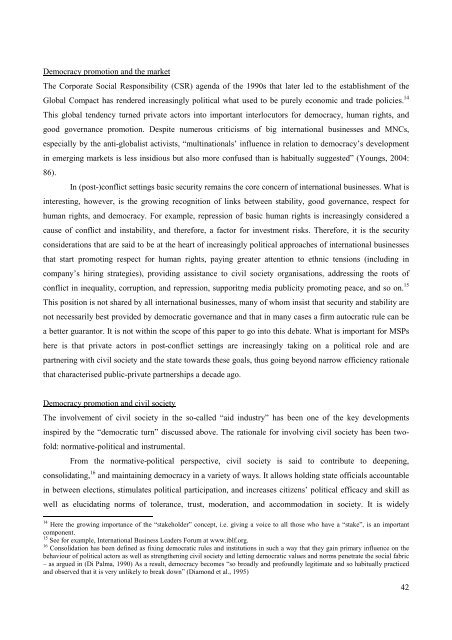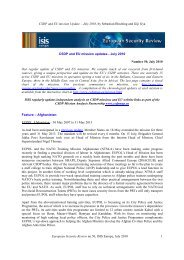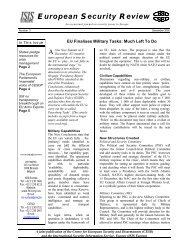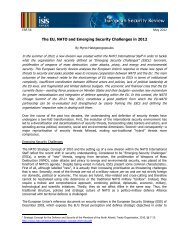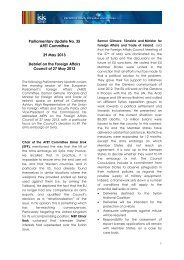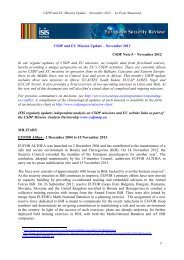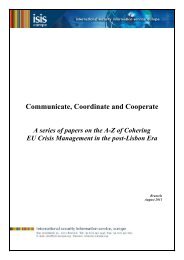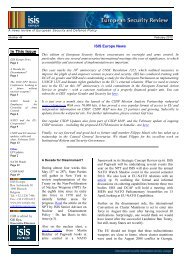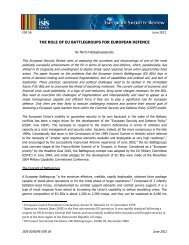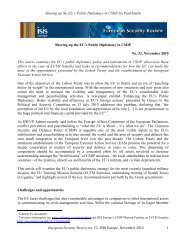Multipart thematic paper on multi-stakeholder ... - ISIS Europe
Multipart thematic paper on multi-stakeholder ... - ISIS Europe
Multipart thematic paper on multi-stakeholder ... - ISIS Europe
You also want an ePaper? Increase the reach of your titles
YUMPU automatically turns print PDFs into web optimized ePapers that Google loves.
Democracy promoti<strong>on</strong> and the market<br />
The Corporate Social Resp<strong>on</strong>sibility (CSR) agenda of the 1990s that later led to the establishment of the<br />
Global Compact has rendered increasingly political what used to be purely ec<strong>on</strong>omic and trade policies. 14<br />
This global tendency turned private actors into important interlocutors for democracy, human rights, and<br />
good governance promoti<strong>on</strong>. Despite numerous criticisms of big internati<strong>on</strong>al businesses and MNCs,<br />
especially by the anti-globalist activists, “<strong>multi</strong>nati<strong>on</strong>als’ influence in relati<strong>on</strong> to democracy’s development<br />
in emerging markets is less insidious but also more c<strong>on</strong>fused than is habitually suggested” (Youngs, 2004:<br />
86).<br />
In (post-)c<strong>on</strong>flict settings basic security remains the core c<strong>on</strong>cern of internati<strong>on</strong>al businesses. What is<br />
interesting, however, is the growing recogniti<strong>on</strong> of links between stability, good governance, respect for<br />
human rights, and democracy. For example, repressi<strong>on</strong> of basic human rights is increasingly c<strong>on</strong>sidered a<br />
cause of c<strong>on</strong>flict and instability, and therefore, a factor for investment risks. Therefore, it is the security<br />
c<strong>on</strong>siderati<strong>on</strong>s that are said to be at the heart of increasingly political approaches of internati<strong>on</strong>al businesses<br />
that start promoting respect for human rights, paying greater attenti<strong>on</strong> to ethnic tensi<strong>on</strong>s (including in<br />
company’s hiring strategies), providing assistance to civil society organisati<strong>on</strong>s, addressing the roots of<br />
c<strong>on</strong>flict in inequality, corrupti<strong>on</strong>, and repressi<strong>on</strong>, supporitng media publicity promoting peace, and so <strong>on</strong>. 15<br />
This positi<strong>on</strong> is not shared by all internati<strong>on</strong>al businesses, many of whom insist that security and stability are<br />
not necessarily best provided by democratic governance and that in many cases a firm autocratic rule can be<br />
a better guarantor. It is not within the scope of this <str<strong>on</strong>g>paper</str<strong>on</strong>g> to go into this debate. What is important for MSPs<br />
here is that private actors in post-c<strong>on</strong>flict settings are increasingly taking <strong>on</strong> a political role and are<br />
partnering with civil society and the state towards these goals, thus going bey<strong>on</strong>d narrow efficiency rati<strong>on</strong>ale<br />
that characterised public-private partnerships a decade ago.<br />
Democracy promoti<strong>on</strong> and civil society<br />
The involvement of civil society in the so-called “aid industry” has been <strong>on</strong>e of the key developments<br />
inspired by the “democratic turn” discussed above. The rati<strong>on</strong>ale for involving civil society has been twofold:<br />
normative-political and instrumental.<br />
From the normative-political perspective, civil society is said to c<strong>on</strong>tribute to deepening,<br />
c<strong>on</strong>solidating, 16 and maintaining democracy in a variety of ways. It allows holding state officials accountable<br />
in between electi<strong>on</strong>s, stimulates political participati<strong>on</strong>, and increases citizens’ political efficacy and skill as<br />
well as elucidating norms of tolerance, trust, moderati<strong>on</strong>, and accommodati<strong>on</strong> in society. It is widely<br />
14 Here the growing importance of the “<strong>stakeholder</strong>” c<strong>on</strong>cept, i.e. giving a voice to all those who have a “stake”, is an important<br />
comp<strong>on</strong>ent.<br />
15 See for example, Internati<strong>on</strong>al Business Leaders Forum at www.iblf.org.<br />
16 C<strong>on</strong>solidati<strong>on</strong> has been defined as fixing democratic rules and instituti<strong>on</strong>s in such a way that they gain primary influence <strong>on</strong> the<br />
behaviour of political actors as well as strengthening civil society and letting democratic values and norms penetrate the social fabric<br />
– as argued in (Di Palma, 1990) As a result, democracy becomes “so broadly and profoundly legitimate and so habitually practiced<br />
and observed that it is very unlikely to break down” (Diam<strong>on</strong>d et al., 1995)<br />
42


